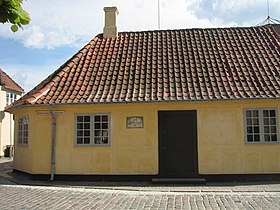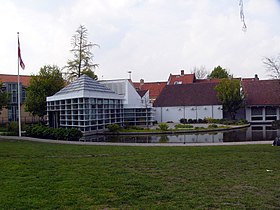House Of Fairytales
They variously comprise the H.C. Andersen Museum (existing museum), the H.C. Andersen Birthplace (original museum), the H.C. Andersen Childhood Home, and even Møntergården (city museum). A new installation called House of Fairytales (called New H.C. Andersen Museum) is planned to open in late 2020.
They are administered and managed by Odense City Museums, a department of the Odense Municipality.
H.C. Andersen's Birthplace
The birthplace (Danish: H.C. Andersen's Hus) is located in the building which is thought his birthplace (not conclusively confirmed), a small yellow house on the corner of 45 Hans Jensens Stræde and Bangs Boder street in the old town. In 1908, the house was reopened as the H.C. Andersen Museum. It documents his life from his childhood years as the son of a shoemaker to his schooling, career as an author, and later life, with artifacts providing an insight into his acquaintances and adventures. The birthplace is also known as H.C. Andersen's House, after the plaque at the front door Danish: H.C. Andersen's Hus.
H.C. Andersen's Childhood Home
Andersen's childhood home (Danish: H.C. Andersens Barndomshjem) is at 3-5 Munkemøllestræde, not far from the cathedral. He lived in the little half-timbered house from the age of two until he was 14. Opened as a museum in 1930, the house contains an exhibition of the cobbling tools used by his father and other items based on Andersen's own descriptions.
H.C. Andersen Museum
The museum is located at 11 Claus Bergs Gade, and comprises exhibits and collections from Andersen's works and life.
Planned House of Fairytales
In 2016, it was announced that Japanese architect, Kengo Kuma, and museum design consultancy, Event Communications, had won an international competition to design a new House of Fairytales concept for the Hans Christian Andersen Museum (also called the New Hans Christian Andersen Museum). Kuma's designs revolve around "a series of cylindrical volumes with glass and latticed timber facades, and scooped green roofs". Event Communications said that the museum would follow an "immersive theatre" that "taps into a fundamental aspect of fairytales – they are journeys where the line between the everyday and the transformative is blurred". The project is being managed by Odense City Museums and plans are for it to open in late 2020.
Gallery
-
Birthplace and original museum
(45 Hans Jensens Stræde) -
Childhood Home
(3-5 Munkemøllestræde) -
Current museum, rear view
(11 Claus Bergs Gade)
References
- ^ "House of Fairytales". Odense Bys Museer (Odense City Museums). 9 January 2017. Retrieved 9 October 2019.
- ^ "Hans Christian Andersen's Birthplace". Visit Odense. Retrieved 6 October 2019.
- ^ "H.C. Andersen's Childhood Home". Visit Odense. Retrieved 8 October 2019.
The little house where H.C. Andersen lived with his parents from the age of 2 to 14, was opened as a museum in 1930.
- ^ "Hans Christian Andersen's Museum". Visit Odense. Retrieved 8 October 2019.
- ^ "H.C. Andersen Museum". H.C. Andersen Odense. Retrieved 6 October 2019.
- ^ "Kengo Kuma and Event Communications wins competition to design fairytale-themed Hans Christian Andersen museum expansion". Attractions Management. 26 April 2016.
- ^ Angus Montgomery (9 May 2016). "Event Communications wins Hans Christian Andersen museum competition". Design Week.
- ^ Jessica Maris (22 April 2016). "Kengo Kuma reveals plans for Hans Christian Andersen Museum in Odense". Dezeen. Retrieved 6 October 2019.
- ^ "Stroll Through a Fairytale Forest". Event Communications. Archived from the original on 28 November 2020. Retrieved 6 October 2019.
The existing Hans Christian Andersen Museum opened in 1908 and is located in Hans Christian Andersen's childhood home in Odense. As part of a Denmark-wide initiative to expand the country's cultural tourism offer, the City of Odense has embarked on an ambitious project to transform the museum into a flagship tourist attraction, harnessing the worldwide appeal of Andersen's stories.


